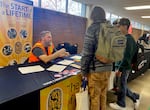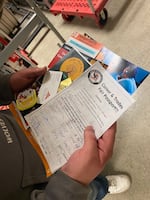Whether Oregon prepares its high school students for life after college is an ongoing question in the state, fueled in the last several years by the state’s decision to postpone a graduation requirement about “essential skills.” Before 2020, Oregon students had to prove that they’d mastered a set of essential skills, which included things like knowing how to “read and comprehend a variety of texts” or “apply mathematics in a variety of settings.”
Related: OPB's Class of 2025 project
For years, most Oregon high school graduates proved their mastery through a standardized test. But with the pandemic, that requirement for graduation was suspended and has been removed until at least 2028.
The state of Oregon now says passing a standardized test shouldn’t be a graduation requirement, something other states are rethinking too.
“State summative tests are designed to show how education systems are serving groups of students, and Oregon continues to administer statewide summative tests; however, these tests are not designed to determine if a student should graduate from high school,” according to the state’s latest statewide report card.
The state even quotes a 2022 letter from U.S. Secretary of Education Miguel Cardona, which urged states to “take additional steps to reduce the high stakes of assessments in such State decisions as graduation or promotion requirements.”
“Please do not confuse this with a recommendation to lower standards; rather, standards for students should remain high as this will lead to stronger outcomes in the long run,” the letter stated.
A statewide report from 2022 found that Oregonians do want changes to the state’s graduation requirements, changes that come with input from business representatives and colleges. The state’s 2020-2024 career technical education plan, from the Oregon Department of Education and the Oregon Higher Education Coordinating Commission, outlines some of the state’s goals when it comes to collaborating with industry.
But as the state continues to figure out just what graduation requirements should look like going forward, OPB asked colleges and employers what skills they think students should learn by the time they graduate from high school.
Here are nine things they shared:
Soft skills, soft skills, soft skills
Almost everyone OPB talked to for this story mentioned some kind of “soft skills”: things like how to communicate effectively, work with others, and be punctual. These skills are valuable no matter the path after high school.
It may seem like a no-brainer, but communication skills are important in adulthood. However, Natasha Garrison said students struggle with that, especially after years of interacting over a screen during the pandemic.
“We’re really seeing that interaction piece being challenging, the anxiety is really high when they are having to interact in ways that they’re not comfortable with,” she said.
Garrison works for the Southwestern Oregon Workforce Investment Board, a regional organization. Garrison’s role is to run a program called Recruit HIPPO (Helping Individuals Pursue Professional Opportunities), which helps students in Coos, Curry and Douglas counties with workforce training. It connects schools with businesses and prospective employees with future employers through job shadows, internships, and other opportunities.
She said being mindful and knowing how to remain calm in challenging situations is another important “employability skill.”

A representative from the International Union of Painters and Allied Trades talks to students at the David Douglas High School Career & Trades Fair on Nov. 15, 2023. Representatives from Oregon businesses say high school graduates should be able to communicate effectively and work in teams.
Elizabeth Miller / OPB
Scott McConnell is the interim dean of the College of Business at Eastern Oregon University. He also owns Side A Brewing, a local business in La Grande. He said working with others is something students can learn about in high school, whether it’s being a part of a sports team or working on a group project. College offers even more of those opportunities. Along with a good work ethic, being part of a team and being social is something he’s looking for from any potential employee at his brewery.
“If your path is not to go to college, for instance, being as socially advanced as possible to kind of understand empathy, what people are looking for, what people need, I think those are some of the soft skills that are really important,” McConnell said.
Paul Diaz is a business representative and organizer with Ironworkers Local 29, the union representing ironworkers in Oregon and Southwest Washington. Diaz often goes to career fairs where students don’t even know ironwork or other trades are a potential career choice.
Diaz doesn’t expect potential ironworkers to know the ins and outs of the job when they apply for apprenticeships the union offers. But he does look for things like having a good attitude and showing up on time.
“Everything else will just fall into place,” Diaz said, “because going through your apprenticeship, there’s a lot of mentors there and then you have a lot of mentors on the job.”
Financial literacy
The state of Oregon is already on this, as legislators passed a bill this year requiring students to earn a half-credit in finance education and other post-high school skills in order to graduate, starting in 2027.
McConnell said financial decisions made at 18 or 19 can have long-term effects. Knowing how credit cards and interest rates work, for example, can help people avoid financial pitfalls later on. He said it’s something he wished he knew more about when he was younger.
“I think a lot of us make financial mistakes throughout that era of life because you’re not used to keeping a budget,” he said.
Going to college is also a big financial decision with future ramifications.
“If you are taking on a lot of debt and a lot of loans for your college education, if you can keep that reasonable, then that college degree really pays off,” he said. “If you take on too much debt, then yes, that can be very problematic.”
Shoshana Zeisman-Pereyo, executive director of student learning initiatives in the Portland State University Learning Center, said financial literacy is “critical.”
“Graduates should possess basic financial principles, budgeting skills, and an understanding of personal finance to navigate their financial responsibilities effectively,” she said.
Clerical skills can make you more employable
Keith Wilson is the president and CEO of Titan Freight, a regional transportation company operating in Oregon, Washington and Idaho. He’s also vice chair of the board for Word is Bond, a Portland-based nonprofit that works with young Black men around areas like leadership and career development.
Speaking as the CEO of a transportation company, Wilson said there are 80,000 job openings nationwide for truck driving, with more openings coming.
“We have a large job opening gap right now,” Wilson said.
Though his company doesn’t hire drivers until they’re 23, there are other openings — and other hands-on skills young people can acquire that Wilson said will make them more well-rounded.
“We have a need for everything — from typing skills, which is clerical, office, to warehousing positions, mechanic positions, and driving positions,” Wilson said.
“Hands-on skills, I think benefits everybody.”
Work experience not required, but recommended
Like Garrison in southern Oregon, Heather Ficht is part of a workforce investment board in central Oregon. Ficht is the executive director of East Cascades Works, which connects businesses and schools to help students find jobs and gain skills that will help them.
Ficht said the best way to prepare for a job after high school is to get a job while you’re still in high school. It’s a crash course in soft skills and life skills, from making sense of your first paycheck to problem solving through a sticky situation.
“We can sit kids in a classroom and have those conversations all day long, but until you actually report to work and understand being part of a team and things like that, I think that it’s challenging for young people to really understand,” she said.
“I don’t get the impression that there’s this magic list they have of hard skills, like, ‘I want them to compute math at this level’ … it’s more about life skills, appropriate behavior,” she said. “‘What’s OK at work? What’s not OK?’ Appropriate dress, hygiene, that sort of thing.”

Representatives from companies and career-related programs set up tables at David Douglas High School with information about different careers.
Elizabeth Miller / OPB
Ficht said getting students jobs doesn’t need to fall on schools and teachers alone but could be possible through partnerships with businesses and workforce boards like her own.
This is also where career technical education programs can come in. CTE classes can help students gain tangible skills while also checking out different career options.
Paul Diaz with Ironworkers Local 29 recalled taking shop class when he was in high school, where he learned about the opportunities available to him other than college.
And with CTE programs across the state, Diaz said schools can go one step further than just sharing opportunities — students could earn certifications for getting a job, like a welding certification.
“We call welding, in our trade, the money maker, because if you have those certifications, you’re a very needed tradesperson,” he said.
“If we can figure out how to fund that, these kids can go to any trade and they will be at the top of the list to get into these apprenticeship programs.”
Ficht, whose organization also works to set students up with internships in high school, said there are also some benefits to bad job experiences like getting fired.
“Getting fired when the stakes are very low and you’re not out on your own and you maybe aren’t going to be able to make rent because you got fired, it’s a really healthy thing to learn early in your career through an internship,” she said.
Asking for help
“One of the best skills that can be taught to high school students is learning how to self-advocate,” PSU’s Zeisman-Pereyo said. She said faculty is there to help students understand what they’re learning. But asking for help and knowing how to self-reflect is important.
“As in life, college will get bumpy, but a student who knows how to self-advocate will have a better chance of finding the appropriate resources to help them succeed.”
In the “real world,” it might be hard to tell what pay is a livable wage, what opportunities are out there, and the steps to take to get a job in a certain field, or at a certain level. But there is support available in high school, whether through teachers, counselors or other staff.
Garrison, from southwestern Oregon, said sometimes she’ll see young people who have graduated from high school and been out of school with nothing on their resume, or students who graduated then had a series of brief stints at several different jobs. To an employer, she said that might not look like a successful applicant. But it might be pointing to a different challenge.
“When you talk … to the student, it’s that they didn’t know what to do,” she said. “It wasn’t a lack of desire to do something, it was a lack of knowing how to move forward.”
Open-mindedness and awareness of the world around you
Amy Nguyen is the founder and president of Dragonberry Produce, a specialty produce wholesaler that operates internationally but is based in Canby. She travels all the time for her job. She said experiencing other environments and regions — even just trying another culture’s food — is a valuable experience.
“We don’t know how to train our students, our new upcoming employees, our workers, who can be future leaders or future owners — unless they can get exposed,” Nguyen said. “If they don’t get exposed, they’re living in a bubble.”
“I think the best thing that schools and teachers should do for their students is to encourage them to embrace the flexibility and openness to try to explore,” she said.
Zeisman-Pereyo with PSU said that being globally aware and open to “embracing a variety of ideas, viewpoints, and challenges” is helpful in the college space too.
“College can be demanding and difficult, but it is also rewarding when students are self-aware and can clearly define the value they place on their education,” Zeisman-Pereyo said.
EOU’s Scott McConnell said taking time to explore is important at the beginning of a postsecondary career.
“Be as loose and as general as you can, don’t try to be ultra-specific,” he said. “I think I changed my major, like, three or four times.”
But it’s also about being open minded with yourself, whatever the path may be.

Representatives from different companies came to David Douglas High School in Southeast Portland on Nov. 15 for the school's Career & Trades Fair. Students who talked with several organizations could enter a raffle.
Elizabeth Miller / OPB
No one’s path is clear. Ficht, with East Cascades Works, said the key is to develop a variety of skills and to be open to change.
Paul Diaz is a business representative and organizer with Ironworkers Local 29, the union representing ironworkers in Oregon and Southwest Washington. Diaz often goes to career fairs where students don’t even know ironwork or other trades a a potential career choice.
“Life is messy and people are messy and I think it’s unrealistic for us to want a 16-, 17-, 18-year-old to figure out what they’re going to do with their life at that age and pick a vocation or a career path,” she said.
The final three points might seem familiar — reading, writing, and knowing how to do math are three of the essential skills students had to prove they’d “mastered” until 2020. They’re also three important things in the eyes of employers and college officials.
Not just knowing how to read — but understanding what you’re reading
Bridget Jones, director of admissions and recruitment at PCC, said it’s important that students know how to read and apply what they’re reading to a given situation.
“Though many students learn in different ways, there continues to be a significant amount of critical information that is communicated through written word; from application instructions, job training manuals, interpersonal communications, and so much more,” Jones said via email to OPB.
What Jones is pointing out is familiar territory for reading instructors working with students as young as the first few years of elementary school. Education researchers have said for years that reading — starting as early as third grade — is a critical way for students to access information. The old adage is that students “learn to read” until they’re in third grade and “read to learn” after that.
Writing “because that’s communication”
Reflecting on his own high school career, Wilson said his “skill set” coming out of high school was lacking. He said he didn’t have guidance, or get the basic skills he needed, especially writing. He went to Portland Community College to take writing classes.
“When you don’t learn that rudimentary skill … when you miss that for the first 25 years of your life, it’s always a weakness,” Wilson said. “So you’ve got to constantly be trying to neutralize that weakness and that’s what I’ve been doing my whole life.”

Students sitting inside a classroom at David Douglas High School in Portland on Sept. 6, 2023. David Douglas High School has around 2,750 students with 18 students to each teacher.
Caden Perry / OPB
When Amy Nguyen of Dragonberry Produce started college at the University of San Francisco, a private school, she had a roommate who had graduated from private school. Nguyen, who went to public school, said she wished she’d been better prepared in the writing department.
“I felt like I was a little behind than most of the curriculum from private school students,” she said. “I wish that school would give students more writing, more rigorous writing, because that’s communication.”
Being able to write is a skill employers are looking for, according to the National Association of Colleges and Employers. They surveyed about 250 companies in 2022, and 50% of respondents said written communication skills were “very/extremely important.” Other important skills included working in a team and the ability to solve problems.
Math — really.
We already know math is an important piece to completing high school. But John Hamblin, vice president of student development at Mount Hood Community College, says it’s key to success in college too.
“When students struggle in math, they struggle to graduate, whether that’s in high school or whether that’s college as well — [it’s] one of the biggest barriers to graduation,” Hamblin said.
A 2015 report from the Mathematical Association of America found math was a “significant barrier to degree completion in both STEM and non-STEM fields.”
When it comes to jobs, there’s wide variation in how much math is part of daily work. But Hamblin said having the math knowledge the job requires is important, no matter what the field is.
“You don’t have to be an expert in math,” he said. “But if you’re working in the trades and you need to be able to invoice somebody for a charge or a service, you need to be able to do that accurate math.”
Reading, writing, and mathematics — all three skills together — are listed as one of several “core skills” for workers in the World Economic Forum’s 2023 Future of Jobs report, though the skill isn’t as important to companies as creative thinking, technological literacy, or being curious.
If you have questions or story ideas for the Class of 2025, reach out to Elizabeth Miller at emiller@opb.org.



